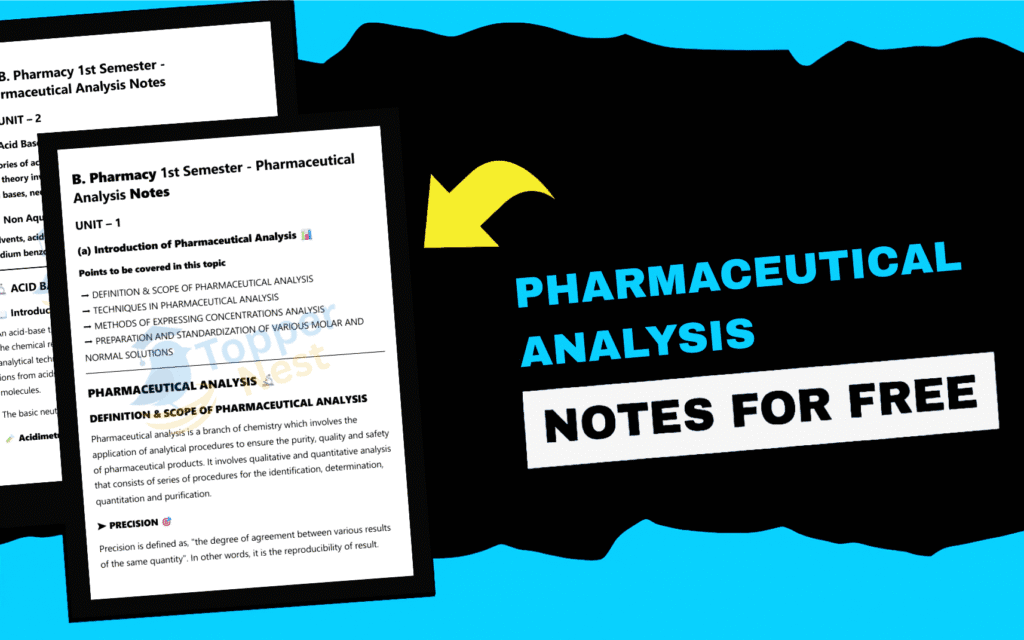If you’re a B. Pharmacy student, mastering Pharmaceutical Analysis is essential. This subject is a cornerstone of pharmaceutical education, focusing on the principles, techniques, and instruments used to identify, quantify, and ensure the quality of drugs and pharmaceutical substances.
In this article, you’ll find:
- Pharmaceutical Analysis notes PDF
- Unit-wise breakdown
- Key definitions

What is Pharmaceutical Analysis?
Pharmaceutical Analysis is a core subject in the B. Pharmacy curriculum that focuses on the principles and methods used to analyze drugs and pharmaceutical substances. It ensures that medications are safe, effective, and of high quality by verifying their identity, purity, strength, and composition.
Definition:
Pharmaceutical Analysis is the systematic study of the qualitative and quantitative evaluation of pharmaceutical compounds using chemical, physical, and instrumental methods. It plays a crucial role in drug development, quality control, and regulatory compliance.
Unit-wise Notes for Human Anatomy and Physiology 1
Why Pharmaceutical Analysis is Important in B. Pharmacy
Pharmaceutical Analysis is more than just a lab-based subject—it is the backbone of drug quality and safety in pharmacy practice. Here’s why it’s essential:
- Ensuring Drug Safety and Efficacy:
Before any medicine reaches patients, it must be analyzed to confirm its identity, purity, strength, and quality. This ensures that drugs are safe and effective. - Understanding Analytical Technique:
Anatomy and physiology provide the background for identifying disorders, imbalances, or dysfunctions in the human body. - Foundation for Advanced Subject:
Subjects like pharmacology, pathology, and clinical pharmacy are built on concepts introduced in HAP 1. - Industry and Regulatory Relevance:
In real-world healthcare, understanding how the body responds to medication is critical for effective treatment and patient counseling. - Exam and Career Importance:
HAP 1 is a scoring subject in university exams and a key part of pharmacy licensing and entrance tests.
Benefits of Our Pharmaceutical Analysis Notes
Looking for a reliable study resource to excel in Pharmaceutical Analysis during your B. Pharmacy course? Our professionally curated notes at Toppernest.com are designed to help you understand analytical concepts with ease and confidence.
Frequently Asked Questions (FAQs)
1. What is Pharmaceutical Analysis?
Pharmaceutical Analysis is the science of identifying and quantifying drugs and pharmaceutical substances to ensure their quality, safety, and efficacy.
2. Why is Pharmaceutical Analysis important in pharmacy?
It is crucial for quality control and assurance in drug manufacturing, ensuring that medicines meet pharmacopeial standards and regulatory requirements.
3. What are the key topics covered in Pharmaceutical Analysis?
- Acid-base titrations
- Redox titrations
- Complexometric titrations
- Non-aqueous titrations
- Gravimetric analysis
- Limit tests (for impurities)
- Basics of spectroscopy and chromatography
4. Is Pharmaceutical Analysis a practical or theory subject?
It includes both theory and practical components. You’ll learn analytical techniques in class and apply them in laboratory experiments.
5. What is the use of limit tests in Pharmaceutical Analysis?
Limit tests detect and control impurities in pharmaceutical substances, ensuring the drug is safe for consumption.
